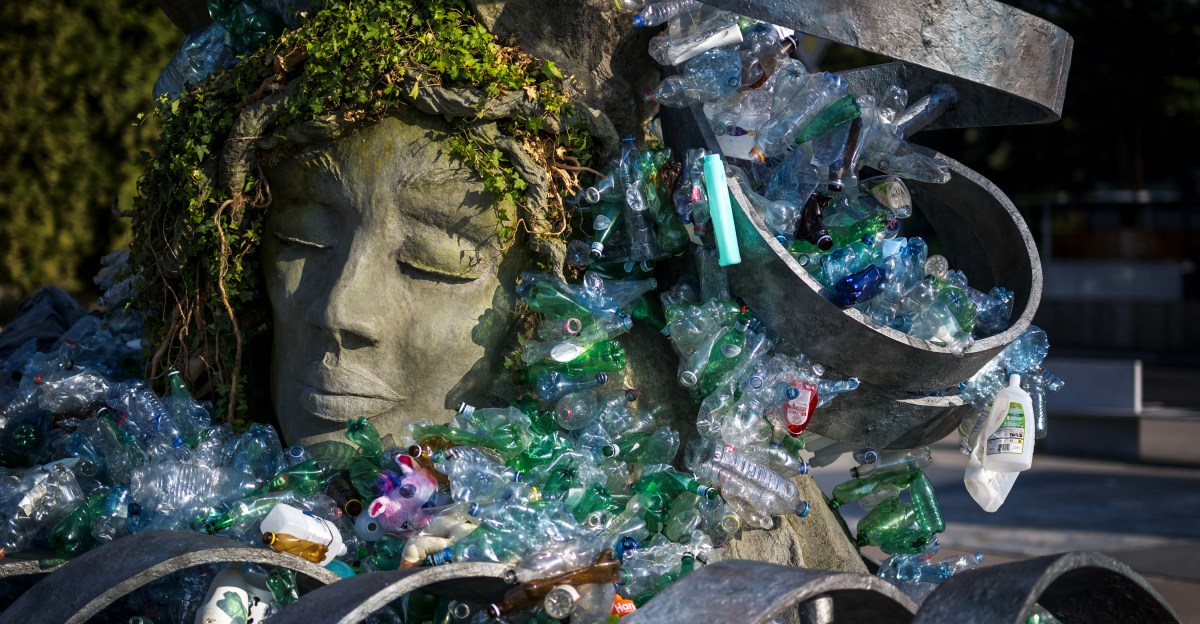Politics
Microplastics Detected in Geneva as Global Plastic Treaty Talks Intensify

As delegates from around the world converge on Geneva for crucial negotiations aimed at establishing a global plastics treaty, new findings reveal the presence of microplastics in the air of the city. Greenpeace, which conducted air sampling prior to the talks, discovered at least 12 types of microplastics, including polyester and polyethylene. This study underscores the pervasive nature of plastic pollution, highlighting the urgency of discussions taking place among environmental advocates and government representatives.
Microplastics Found in Urban Air
The air sampling was part of a broader effort to illustrate the seriousness of plastic pollution. Greenpeace strapped an air-monitoring device to an individual in Geneva, who spent approximately eight hours in various public spaces such as shops and cafes. On July 17, 2023, the samples collected revealed the presence of at least 165 fibers and fragments, among which were microplastic particles.
David Santillo, a senior scientist at Greenpeace Research Laboratories, commented on the findings, stating, “That you can find microplastics in urban air is not really shocking because it’s been reported before in other cities. This illustrates that nowhere is free from this pollution.” Although the study was not exhaustive, it contributed to the ongoing discourse surrounding the health implications of microplastics.
Philip Landrigan, director of the Global Public Health and the Common Good Program at Boston College, emphasized the potential risks associated with inhaling microplastics. According to research published in the journal Nature Medicine, microplastics could accumulate in the human brain, with estimates suggesting that a person may contain as much as a spoonful of these particles.
Urgent Call for Action in Treaty Negotiations
As the negotiations for a legally binding plastics treaty are set to conclude on August 14, 2023, the stakes are high. In 2022, United Nations member states agreed to develop a treaty to combat plastic pollution. However, progress has faced significant hurdles, particularly from major fossil fuel-producing nations which have resisted proposals to limit plastic production.
Greenpeace has consistently advocated for a comprehensive approach to address plastic pollution, arguing that merely recycling existing plastic is insufficient. Angel Pago, global plastics campaign media lead for Greenpeace, remarked, “We’re brimming with plastic because of overproduction. And we cannot solve this crisis with just cleanups.”
The organization’s findings come at a critical time, as they align with a growing push from the “high ambition coalition” led by Rwanda and Norway. This coalition aims to address the entire lifecycle of plastics, including the need to restrict the use of hazardous chemicals in plastic production. The Lancet has echoed these sentiments, stating that the primary driver of the health crisis linked to plastics is the accelerating growth in production.
Current data shows that global plastic production has surged from 2 million metric tons in 1950 to an astounding 475 million metric tons in 2022. Alarmingly, less than 10 percent of plastic waste has ever been recycled, largely due to the complexity and costs associated with processing various types of plastics.
Landrigan stressed the importance of capping plastic production to mitigate health risks associated with plastic pollution. “I hope and I pray that the treaty negotiators are actually going to produce a treaty that protects human health,” he stated, emphasizing the need for decisive action in light of the overwhelming evidence linking plastics to serious health issues.
The ongoing discussions in Geneva represent a pivotal moment in the global fight against plastic pollution. With microplastics detected in the very air surrounding the negotiations, the urgency to reach a comprehensive and effective agreement has never been clearer.
-

 Lifestyle3 months ago
Lifestyle3 months agoLibraries Challenge Rising E-Book Costs Amid Growing Demand
-

 Sports3 months ago
Sports3 months agoTyreek Hill Responds to Tua Tagovailoa’s Comments on Team Dynamics
-

 Sports3 months ago
Sports3 months agoLiverpool Secures Agreement to Sign Young Striker Will Wright
-

 Lifestyle3 months ago
Lifestyle3 months agoSave Your Split Tomatoes: Expert Tips for Gardeners
-

 Lifestyle3 months ago
Lifestyle3 months agoPrincess Beatrice’s Daughter Athena Joins Siblings at London Parade
-

 World3 months ago
World3 months agoWinter Storms Lash New South Wales with Snow, Flood Risks
-

 Science3 months ago
Science3 months agoTrump Administration Moves to Repeal Key Climate Regulation
-

 Science2 months ago
Science2 months agoSan Francisco Hosts Unique Contest to Identify “Performative Males”
-

 Business3 months ago
Business3 months agoSoFi Technologies Shares Slip 2% Following Insider Stock Sale
-

 Science3 months ago
Science3 months agoNew Tool Reveals Link Between Horse Coat Condition and Parasites
-

 Sports3 months ago
Sports3 months agoElon Musk Sculpture Travels From Utah to Yosemite National Park
-

 Science3 months ago
Science3 months agoNew Study Confirms Humans Transported Stonehenge Bluestones









